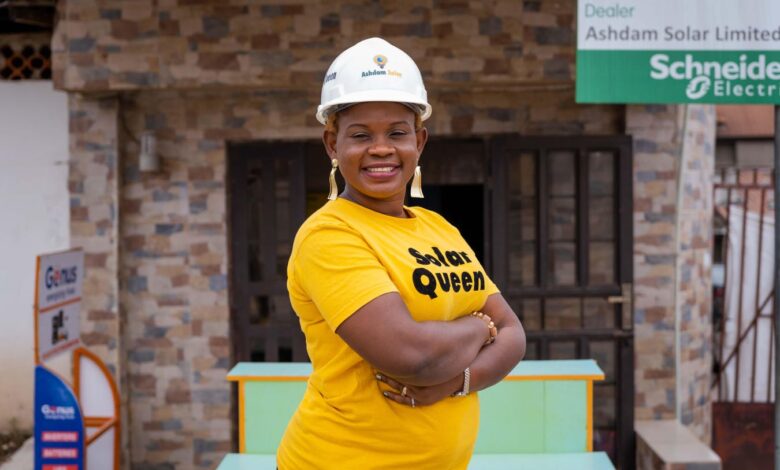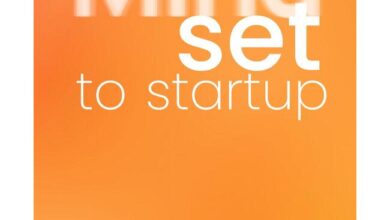Women Entrepreneurs Around The Globe Are Using Tech To Expand Their Reach, But Barriers To Financing Persist

Damilola Asaleye, co-founder and COO of Ashdam Solar Company, is working to revolutionize green energy. Her business provides sustainable, low-cost energy solutions in Nigeria, where 93 million people are without power. Meanwhile, her company has created jobs in her community in Oyo State. She also runs Ashdam Solar Academy, which trains renewable energy entrepreneurs, and a nonprofit that mentors girls and women who want to be technology leaders.
Asaleye strengthened her knowledge of entrepreneurship through the Cherie Blair Foundation for Women’s mobile learning app, HerVenture, and Road to Growth training program for women entrepreneurs. “I see myself contributing to changing the world in a positive way,” Asaleye said in an interview with the foundation. “I see my work in trying to reduce energy poverty as very critical.”
Asalaye is among many women entrepreneurs in low- and middle-income countries who are embracing technology to grow their businesses. Nearly 93% of respondents to the Cherie Blaire Foundation’s recent survey with Intuit, “Bridging the Divide: Women, Technology and Business Success,” reported heavy internet usage. Meanwhile, more than 54% said they planned to spend more on tech in 2024 than they did last year, nearly 45% reported they have already adopted AI tools and, in a sign of their enthusiasm for tech, nearly 66% said more training is needed for wider adoption of AI. The research, conducted in partnership with Intuit, surveyed more than 1,100 women entrepreneurs across 81 low- and middle-income countries. The Cherie Blair Foundation focuses on removing barriers women face to entrepreneurship.
Damilola Asaleye, COO of Ashdam Solar Co Ltd, outside her office in Ibadan, Oyo, Nigeria on 2 August … [+]
The success of women-owned businesses has a ripple effect for society, according to Sian Hawkins, interim director of external engagement for the foundation in an email interview. “When women entrepreneurs succeed, they’re more likely to invest back into their families and community–into education, nutrition, wellbeing, and children’s health. Their businesses are more likely to provide necessary services and opportunities to their communities.”
The report surveyed women in countries including Nigeria, Kenya, South Africa, Guyana, and Uganda, as well as in South and Central America and parts of Asia and Europe. The most common industries were agriculture, food & beverage, and clothing and tailoring. Nearly 79% of those surveyed had completed a university education.
The women surveyed offered insight into the types of support they need to grow their businesses. 80.4% of respondents said there is more need for financial support (financing without the expectation of direct financial returns), access to entrepreneurs’ networks and associations (52.1%), financial investment (47.7%), skills or training (46.0%), and mentorship or coaching (47.6%). 25.6% of the women cited financing as their biggest challenge.
The lack of financing reflects discriminatory laws and practices, according to the foundation. In many countries, women can’t own the assets they need as collateral for a loan, with just 14 countries giving women the same economic rights as men, according to the foundation. Lack of access to capital is a particular obstacle in countries facing very high inflation, such as Nigeria, where inflation is 18.8%, the report notes.
Adding to the funding gap is the fact that women frequently lack access to business networks. That’s particularly true in countries where connectivity is lower or women have less time to network, due to factors like a steep load of unpaid caregiving work, the report notes. The flip side of this is that well-networked women are benefiting from their connections, with 32.8% of respondents attributing success to improved access to business networks, both virtual and in-person.
As Hawkins points out, however, a variety of conditions need to exist for women to thrive as business owners. “To start a successful, sustainable business, women have a range of needs and requirements at the individual level–skills, knowledge, confidence,” said Hawkins. “These enable women to have and access what they need for business ownership, such as a viable business model and plan, finance and formalization. They also need an enabling environment in which to start and run their businesses: families and others who encourage and believe in them, investors and financial institutions to provide appropriate financial products and services, systemic support with barriers such as unpaid care work, safe spaces (online and physical) in which to conduct business, access to markets and networks, and laws, policy and regulatory environments that enable them to flourish rather than hold them back.”
Obstacles such as discrimination, political instability, displacement in their countries, and lack of infrastructure, as in South Africa, where the cost of data is very high, contributed to the challenges women reported they were facing.
“Unfortunately, across the world but particularly in low- and middle-income countries, women are often held back from accessing what they need to start successful businesses, and do not experience an enabling environment,” Hawkins said.
Among the foundation’s recommendations to NGOs, governments and those in the funding ecosystem who want to support women entrepreneurs are:
- Adding training programs for women entrepreneurs to boost their digital literacy, formalize their businesses, access finance through the banking sector and grow their networks
- Providing access to technology and digital tools
- Offering both skills-development programs and subsidies.
The foundation recommends that governments pass laws that prohibit gender-based discrimination in access to credit. Meanwhile, financial institutions and investors can support women “by recognizing and addressing the implicit and explicit biases in their operations – from product design to stereotypes held by decision-makers – in order to proactively take steps to facilitate more funding to women-owned businesses,” Hawkins said.
Steps must also be taken to prevent online gender-based violence against women, the foundation advocates. Among respondents, 45.4% reported that experiences of online gender-based violence has affected their business, with 9.3% stating these incidents had significantly or drastically impacted their business.
Overcoming the barriers to women’s entrepreneurship could have a significant impact on the global economy. A recent analysis by Boston Consulting Group found that if women and men participated equally as entrepreneurs, the global GDP could rise by up to 6% and boost the global economy by $2.5 to $5 trillion. “Women-owned businesses have enormous potential to boost local economies and global GDP,” says Hawkins.



